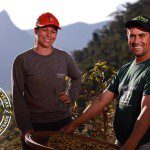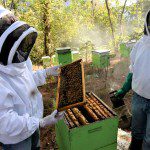Behind every cup of coffee is a complex global supply chain involving a roaster, global logistics, import and export stakeholders and of course coffee farming families. More than ever COP26 highlighted the injustice of small-holder farming families who contributed little to the climate crisis while being most exposed and least able to adapt to its impact. This is climate poverty, the nexus and output of imperfect markets both in terms of food commodities and wider carbon impact of economic activity in the global north.
Estimates vary as to the scale however according to the Fairtrade Foundation there are more 20 million smallholders supporting around 125 million people just in coffee. On a wider scale 80% of the world’s half a billion farms are smallholdings with families relying almost entirely on their land for survival. Food security, the stable physical and economic access to ample safe and nutritious food remains a key concern in small-holder communities.
Often on a knife edge economically, smallholders rely on intercropping of household food alongside cash crops such as coffee to put food on the table. As the impacts of the climate crisis take hold the viability of smallholders in many regions around the world comes into question in terms of the ability to generate enough cash crops for an income and enough food for the household.
Every cup of Fairtrade coffee has been sourced from a community farming co-operative; these organisations play a key role in empowering their own smallholder members to build local solutions to adapt to the climate crisis. A premium of $0.20 for every pound of green coffee sold under Fairtrade contracts is ringfenced for community projects; increasingly these are looking to support farmers with climate adaptation; from persevering soil moisture and smart tree planting to prevent soil erosion and provide shade. This premium is in addition to the Fairtrade minimum price which provides a minimum floor to protect from volatility in the coffee market. Elsewhere the premium may be used to help ensure stable food production for the farming household or to diversify income in often in ways that bring more gender equity to the family and community.
At Matthew Algie we are very clear that our responsibility is to reduce the carbon we emit as a business. We have measured our carbon footprint for several years now and while we work on reduction, we have chosen to work with One Carbon World to offset the remainder of our emissions. These high-quality carbon credits are part of the solution however are always looking at ways to innovate.
More than 90% of our coffee comes from certified sources across the coffee growing regions we have seen amazing examples of environmental best practice. Following discussions at COP26 we pleased to explore the potential for in-setting through payment for environmental services supporting carbon sequestration within our own supply chain with long-term partners Capucas located in western Honduras – watch this space.
Celebrating 25 years of Fairtrade at Matthew Algie
We here at Matthew Algie are incredibly proud of the...
Read MoreSimply the Best: Matthew Algie recognised as Europe’s Best Coffee Roaster
We are delighted to have been named the Best Coffee...
Read MoreMatthew Algie crowned Glasgow’s Green Champion
Sustainability is at the heart of everything we do here...
Read MoreThese coffee farmers have been busy as bees diversifying their income
In late 2020 we decided to invest in a project...
Read More



